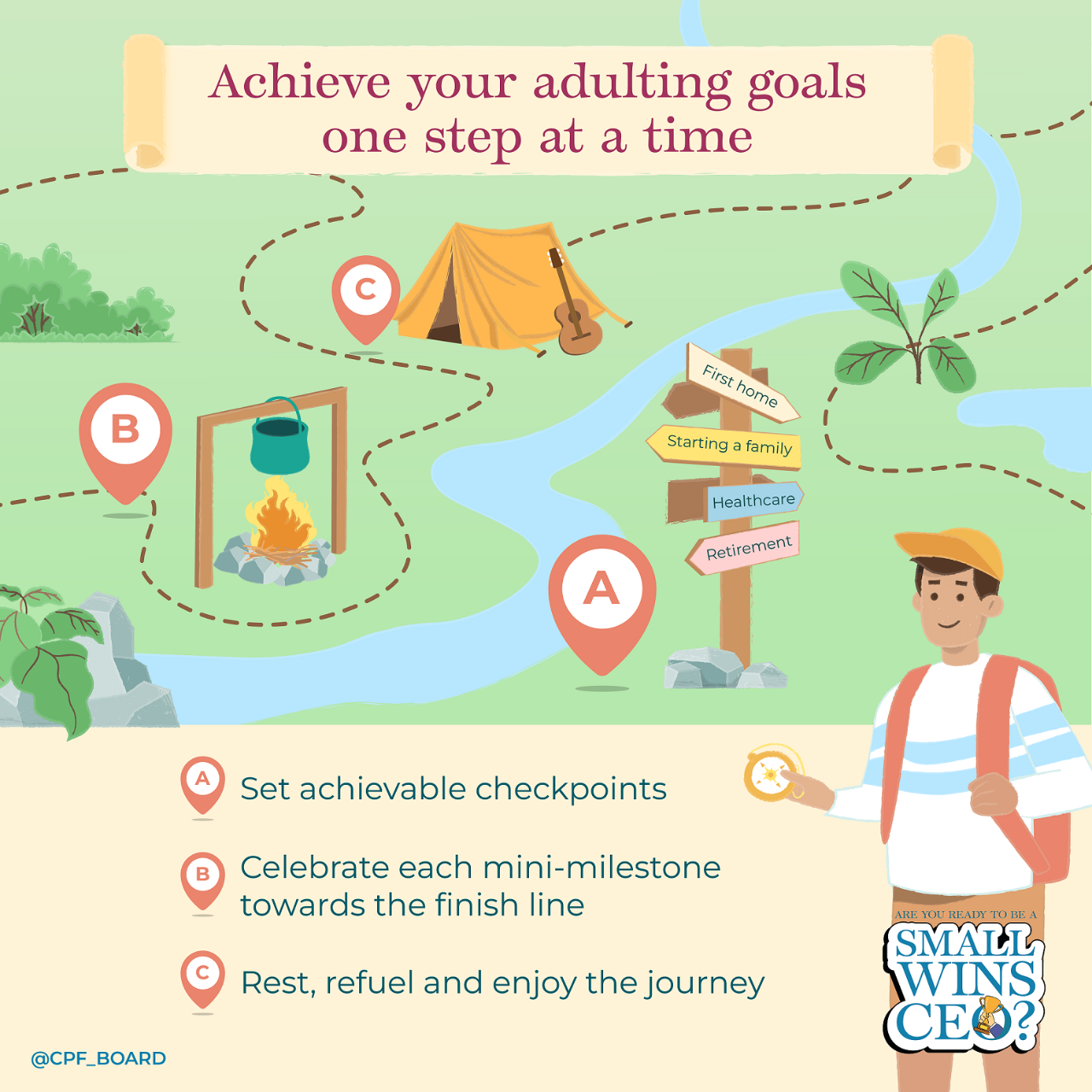30 Aug 2023
SOURCE: CPF Board
Are you taking your first steps into the working world as a first jobber? As you take charge of your finances and embark on your journey towards financial independence, it can get overwhelming. But fret not, this article will show you how you can start small and win big, and eventually become the CEO of your finances.
Here are some examples of breaking down big goals into small wins.
This goal requires discipline and patience. Let’s identify the small wins that you can work towards.
The foundation of good financial planning is a structured approach to budgeting. Get started with three simple steps:
Save first, then spend. Aim to save at least 20% of your income every month, or more if you can.
Understand where your money goes every month. How much are you spending on transport, food and other expenses such as repaying your student loan?
If you’re overspending, are there any areas where you can cut expenses? For example, a subscription service that you barely use anymore.
Don’t be discouraged if you are not able to stick to your budget closely in the beginning. Just keep trying — it will get better!
As you work, you’ll start making contributions to your CPF (yay you!). Familiarise yourself with how CPF works. For instance, every month, 20% of your salary goes into your CPF, and your employer contributes another 17%. These contributions earn steady interest to help you in the various chapters of your life.
It's important to enjoy your hard-earned money, but just as important to balance your wants with your current and future needs. These include money apportioned for emergency funds, your future home, and retirement.
Maintaining this balance is integral to building good money habits. Your wants and needs could change over time, so stay on top of your situation and adjust your finances when necessary. For example, a new computer and desk set-up might have been classified as “wants” to many, but ever since the pandemic, shifting working arrangements made them “needs” to some who work remotely; food for thought.
It’s never too early to start thinking about retirement. While it may not feel as urgent as some other goals such as buying a home, it pays to keep this goal in mind because the earlier you start, the more time you have at your disposal to reach your retirement goal.
If you think of life as a game, retirement could be seen as the post-game — the part where you have completed the main story, and have the freedom to pursue your own path and unlock other things to do.
Have an idea of how you want your golden years to be? You have a reason to start planning! Even if you’re not sure what you want to do in retirement, it’s also good to start planning now.
For starters, getting in earlier means more time for your savings to benefit from the effects of compounding interest. Just how much of a difference does it make to start early? Let’s take a look at John and Jane.
If John saves $60 monthly from age 25, and Jane saves $90 every month from age 35, who will have saved more by age 65 (based on compound interest rate of 4% p.a.)?
| John | Jane | |
| Savings per month | $60 | $90 |
| Savings duration | 40 years | 30 years |
| Total amount saved | $28,800 | $32,400 |
| Final amount after compound interest* | $71,100 | $62,600 |
The answer is John! Despite saving less in total, John will end up with more savings than Jane. That is the power of compound interest and time. So, remember that starting as early as possible is your best bet in getting a head start on your retirement savings.
Doing a yearly review is a great start to periodically evaluate your financial situation. That will give you a clearer picture of how far you’ve come and you can adjust your savings and investment strategies accordingly to stay on track to your financial goals. With CPF Mobile, you can access your CPF account balances conveniently on the go.
As you transition into adulthood, learning more about the various types of insurance and their purpose helps you make informed decisions about your protection needs.
In general, there are two main types of insurance — health insurance and life insurance. The former is for yourself and it helps cushion the financial impact of an accident, illness or disability while life insurance is for dependants to receive financial support in the event of death or total permanent disability. There are many policies out there, so take your time to consider what you really need.
To help you decide what insurance you need, think about the risks you want to protect against (e.g. large medical bills, death, or disability) and the financial loss you or your dependants may suffer if something unfortunate happens. Once you know your circumstances better, the next step would be to prioritise your protection needs and start factoring in your finances.
Different policies have various levels of coverage, and the premiums can vary too, so always compare first before buying. Opt for one that strikes a balance between adequate coverage for your needs and what you can afford. Avoid over-insuring as it can lead to unnecessary expenses — you can always change or add coverage down the road if you need to.
As national healthcare schemes, MediSave, MediShield Life and CareShield Life provide healthcare protection for those with CPF.
MediSave is your personal healthcare savings account that helps you pay for your healthcare expenses
MediShield Life is a health insurance that protects you against large medical bills, regardless of your age or health condition
CareShield Life is a long-term care insurance that provides you monthly cash payouts in the event of severe disability
If you’re wondering whether you need an Integrated Shield Plan (IP), consider your needs such as your preferred hospital and ward choices, and whether you can afford the IP premiums in the long run, as premiums rise substantially with age.

While the adulting journey is daunting, breaking down big goals into smaller, achievable tasks makes it easier to pave the way for a financially secure and rewarding future.
Remember, it's not about achieving everything at once, but about taking one step at a time towards your financial success. Before you know it, you’ll be your very own Small Wins CEO!
The information provided in this article is accurate as of the date of publication.


